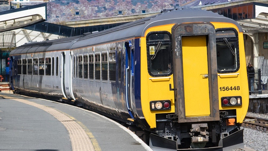Leaders of Northern have appeared before politicians over an “unacceptable” level of service in response to a series of 'do not travel' warnings issued over recent weeks.
Mayor of Greater Manchester, Andy Burnham, called an emergency Rail North Committee meeting on Wednesday to “require a plan to bring an immediate end” to the notices, describing them as “embarrassing” and accusing Northern of “damaging local economies”.
During Wednesday’s emergency meeting, Mayor Burnham said Northern had cancelled 155 services that morning. He also accused the operator of ‘not appearing to have a plan’, with a lack of both ticket acceptance with other operators and bus replacements in place when trains are cancelled cited.
Managing Director, Tricia Williams, said Sunday services in the north west have been hit because crews do not have to work that day, and admitted she was “acutely aware” of the impact cancellations are having on people.
“We don’t always know where these cancellations are going to fall,” she told the committee,” adding there wasn’t “a limitless capacity to put rail replacement transport on”.
Northern has issued do not travel warnings on several weekends with no bus replacements, something Mayor Burnham said “shouldn’t ever be happening”.
Chief Operating Officer, Matt Rice, said that over four-five months the firm had been trying to, within a week’s timeframe, “work out who’s going to volunteer to work on certain routes, who isn’t, and how we patchwork quilt that together to make available a train service”.
“We’ve got that right on some weekends but too often it hasn’t quite worked and we’ve ended up leaving people behind,” he said.
Rice also said Northern would be looking to strengthen the bus fallback option over November and December.
“We know there will be big events in December, particularly that we have to work together to protect,” he added. “As it currently stands it will probably mean there will be some services that we won’t be able to run.
“What we’ve got to do is move away from trying to do lots of things where perhaps we’re not doing things where perhaps we’re not doing many of them well, to a more discreet list of services, more discreet lines or routes between core economies and core events and putting a high level of guarantee on the service.
“None of that is where we want to be. We want to run the 2,500 trains on a weekday, 1,500 or so we promised on a Sunday, reliably.”
A temporary bridge plan is to be submitted to Rail North as Northern bosses look “to give certainty”.
Lord Patrick McLoughlin asked what stops Northern having quicker ticketing agreements, particularly with Operator of Last Resort-run LNER and TransPennine Express, and when decisions on P-coding, where services are cancelled in advance, citing situations where predicted staff absenteeism hasn’t been as bad as feared.
On P-coding, Williams said “we haven’t been P-coding where we’ve got people available, if anything we’ve probably been P-coding too late believing people will be available, and I believe that’s one of the fundamental changes we can make”.
Rice added that P-coding was a 72-hour activity when rostering teams know how many crews there are, where the trains are, and put compile the rotas, but the firm “didn’t have the tech” to allocate resources where “the biggest bang for buck is” as quickly as they liked.
This led to the meeting hearing how fax machines are used to communicate with staff.
When asked if Northern would “get rid of them tomorrow”, Rice said: “Because the tools we use to get information and messages to our crew rely on faxes, amazingly.”
Williams added: “We wouldn’t be able to get rid of them tomorrow without an agreement with our trade unions. We have to look at these issues with the depth and complexity they have and the historical issues that we absolutely are going to address.
“It isn’t as simple as turning them off tomorrow because at the moment we have an agreement to use the processes that we have and in order to change that, we do have to change the agreement.”
The committee called on Northern to improve its communication with passengers, put in place ticket acceptance agreements with other operators when services are cancelled, and to improve its training schedule and how it deals with staff sickness.
The committee will also write to the Treasury and Department for Transport to get a rest day working agreement and a plan for Sundays in place as quickly as possible.
“We do need this now,” Mayor Burnham said, adding that: “The north needs better than an unreliable fax-driven railway.”
“We look to you to lead the change,” he told Williams and Rice, adding that he’d been advised that the plan submitted “isn’t good enough”.
“In short, we need a new plan from you, and it needs to be much better than what we’ve seen so far so that we can minimise the disruption to businesses and residents.”
The plan will be discussed on November 20, by which Rail North Committee also hopes to have an agreement with the Treasury and Department for Transport on rest days and Sundays in place.
*UPDATE: On Friday it was confirmed that Northern's rest day working agreement with ASLEF drivers was agreed on Thursday. The deal last for three years.















Login to comment
Comments
No comments have been made yet.